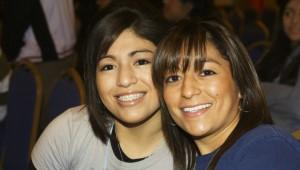The Importance of Understanding Your Latino Identity

Did you know that Jesus entered the world in the flesh, into a particular context and a particular people? Jesus—fully God and fully human—is a true radical when it comes to showing humanity how to love all people, even if your ethnic identity is not all people.
One of my absolute favorite topics to discuss with students is their ethnic identity journey. I love seeing the healing that happens in people from various ethnic backgrounds when they learn that Jesus walked the cross-cultural journey as a refugee in Egypt, a friend of Samaritans, and a Galilean man. None of these aspects of Jesus (his birth place, his immigrant journey, the people whom Scripture records him conversing with) should go unnoticed, for it is these aspects that can reveal to our supposedly post-racist generation what true cross-cultural reconciliation entails.
I am Latina, so I write from my Latina experience. My parents met in Guadalajara, Jalisco, Mexico, in the late seventies when bell-bottoms were the norm and every guy wanted to look like John Travolta (so I assume). Sure enough, my dad looked like a Mexican John Travolta, even to the point of sharing the same kind of chin—the Dimple. My parents were the first in their respective families to graduate high school and take some college classes. My dad was Protestant and my mom was Catholic. Their love grew over a few dances, a few visits, and a mutual ambition to follow Jesus.
As I learn more about my parents’ own ethnic identity and spiritual journey, I am more aware of how similar we are. My parents asked questions about their faith and worked it out in community. At one point this led them to stop dancing, but then, at a later point, it led them to embrace one another again and continue their dance.
Here are a few more ways I’ve grown as I’ve sought to understand my Latina heritage better.
Understanding Scripture
Understanding our ethnic identity is crucial in understanding Scripture. Everyone, and I mean everyone, reads Scripture through a cultural lens. The problem is that most of us are not aware of our lens until we start paying attention to it.
Why does this matter? Por que importa? Because one lens will affirm dancing while another lens will call it sin. One lens will affirm drinking while another lens does not. Yet people of both lenses will claim they are “reading the Bible as it is written,” unaware that they are reading the Bible as a [insert gender] and an [insert cultural background] and a [insert relationship status]—and the list could go on. When we don’t know the lenses we are operating out of, we assume that everyone else reads Scripture the same way we do.
Friends, this is no longer the predominant case in the United States.
Which is why studying the Bible with others is so important. Our assumptions get challenged, our understanding of God is widened, and our biblical literacy is strengthened. We may even find healing in our ethnic identity and freedom as we realize that cultural norms/traditions are not always as clear as we were told.
Developing Compassion
Understanding our Latino culture is crucial in having compassion for all people, including our own people, our gente. Father Greg Boyle, in his book Tattoos on the Heart, asserts that Jesus was not for people, but rather one with people. How can we be “with” people if we have denied, or are ashamed or unaware of, our own? Boyle asks us to imagine a circle of compassion with God and people. “Then we imagine no one standing outside of that circle,” he writes, “moving ourselves closer to the margins so that the margins themselves will be erased.”
So many Latino people live on the margins. My own county has the highest teen pregnancy rate in the nation. There are 11 million undocumented people in the U.S. and over half of them are Latino. We have high rates of incarceration and poverty, and only 11 percent of Latinos in California have a bachelor’s degree. According to the National Center for Educational Statistics, only 5.8 percent of Latinos in the U.S. have a Ph.D. We are quickly becoming the largest ethnic group numerically but the least educated. Compassion is needed. Who will stand with these/our/my people?
Connecting with Family and Jesus
Brenda Salter McNeil describes two kinds of unhealthy ethnic identities. One is the “victim role” where we blame others for our present ills and expect others to fix the problems. Those in the victim mentality do not take responsibility for how they may be contributing to the problem or how they could change the situation. The other identity is the “model minority” where a person holds deep, often unnoticed shame. I grew up wrestling with the model minority identity, as I would hear statistics about my Latino people that caused me to internalize shame. I felt embarrassed for my people who got pregnant before graduating high school or when my friends would ask why my lunch was a burrito instead of the cafeteria food. In order to overcome all of these negative stereotypes, I tried to be the “best Latina” that I could and earn the best grades that I could, but I never felt like my best was “enough.” Shame prevented me from seeing the beauty of my culture and of who God made me to be.
As I started to learn about God’s intentionality in designing our cultures, I began to see the beauty in being a Latina. We have a joyful style of worship that celebrates God’s role in our lives and a strong value for familia that helps us be welcoming Bible study members. I have also found that the more I am aware of the gifts from my culture, the more I am able to connect with my familia; instead of shame about our immigrant background or our economic status or our acculturation, I am able to feel embraced by my God who once was shamed on the cross and shamed by being born in the most humble of places. Jesus, who was supremely rejected, supremely welcomes us and calls us friend, brother, sister. We are his familia.
What step will you take?
We are better witnesses to the nations when we are aware of our own gifts, blind spots, and cultures. If we hope to be world changers, we need to know the worlds we are coming from. Ethnic identity development is a journey, but I hope everyone reading this will choose to take an active step in discovering more about your own ethnic identity.
Ultimately, understanding our ethnic culture is an invitation to understand our identity in Christ. The goal for all of us is to root our core identity in Jesus so that our cultural identity—the beautiful and good aspects of our cultures that we can honor and praise God with—may reflect his goodness.




